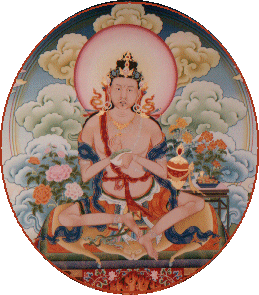![[Main ROKPA Homepage]](images/anilonew.gif)





|
Mahapandita Naropa Part 3: MasteryTilopa was about to take his leave, but Naropa, out of desperation and devotion, clung to Tilopa without any shame or embarrassment and again requested him to be his teacher. Saying neither yes nor no to Naropa's request, Tilopa walked away. |
|
Naropa tried to follow Tilopa, but although Tilopa appeared to be walking normally, and although Naropa was running, he was unable to catch up, no matter how fast he ran. Naropa could see the form of Tilopa in front of him, but he was unable to get closer. As this area in India was particularly hot and arid, it became very difficult for Naropa to keep running after Tilopa, and although he subjected himself to thirst, hunger, and fatigue, he was not able to catch up.
Eventually, Naropa saw Tilopa sitting on a very high cliff. He went over to him and prostrated, again requesting Tilopa to be his teacher. Tilopa responded by saying, "If you were really desperate and determined to learn about the teachings, you would obey my order to jump off this cliff without any hesitation because you would be able to understand how important it is to follow the commands of your master." Naropa jumped off the high cliff and fell to the ground. All his bones and joints were broken into many, many pieces. Tilopa went down to Naropa and inquired, "Are you experiencing any pain?" Naropa replied, "The pain is killing me!" This is how Naropa got his name. ("Na" in Tibetan means "pain," "ro" means "killing" and "pa" makes the word a noun.) Tilopa gently touched Naropa's body and all his broken bones joined together and were healed.
After undergoing so much suffering, Naropa once again asked Tilopa to give him the profound teachings. Tilopa said, "You are not yet pure enough to be introduced to the nature of mind!" With a wrathful expression, Tilopa removed his slipper and slapped the face of Naropa so hard that Naropa fainted. When he regained consciousness, Naropa's mental state of realization was equal to that of his teacher.
Becoming very peaceful, Tilopa lovingly explained to Naropa why he had to be so very wrathful and subject him to so much suffering. He explained, "The fact that I led you into so many painful circumstances does not mean that I am a cruel person. Your negative karma could not be purified by your own effort alone. Only by your actually experiencing hardship could you purify the negative karma that prevented you from realizing the ultimate nature of buddhahood. Throughout all your experiences of hardship, you did not develop any doubts, hesitation, or wrong views, and you diligently obeyed all commands. In this way you were able finally to overcome the conflicting emotions and experience realization."
If we compare the life stories of Milarepa and Naropa, both experienced extreme hardships. However, Naropa experienced more intense pain than Milarepa, but the duration of Milarepa's experiences was longer.
In case any of us might still be wondering if such harshness is really necessary to reach enlightenment, let us take the example of a vessel that is encrusted with rust. The rust on the metal container is so rough that trying to remove it with a soft cloth and gentle hand, we would not be able to remove any rust at all. The more effective way to remove the rust would be to find another very rough substance even rougher than the rust. If we rub the container with this, then the rust can be removed. Similarly, the negative karma obscuring the true nature of mind cannot be removed by softness or gentleness, nor can the achievement of realization occur if a teacher is overly kind. Harshness is needed. If a teacher allows his students to be lazy and is too soft-hearted, the students will be unable to uncover and purify their mental stains. Harshness and roughness on the part of the teacher are essential.
After Naropa reached the stage of realization equal to his teacher, Tilopa assured him that they were inseparable. They had never been separate in the past, were not separate in the present, and would never be separate in the future.
Tilopa and Naropa became so famous throughout India that in the eyes of the people they were as familiar as the sun and the moon. Renowned for their realization, wisdom, and profound learning, Tilopa and Naropa turned the wheel of Dharma uncountable times in all directions.
This teaching on The Life of Naropa was given by Ven. Khenpo Karthar Rinpoche at KTD, Woodstock, NY, on March 25-30, 1986. It was translated by Chojor Radha and edited by Tina Armond. Part I appeared in Densal Vol. 8, No. 1, Winter 1986/87; Part II appeared in Densal Vol. 8, No. 2, Spring 1987.
